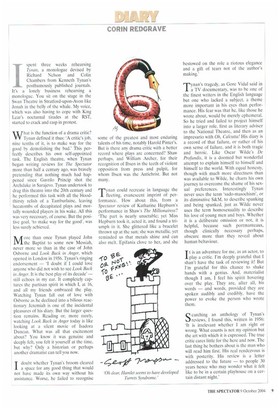I spent three weeks rehearsing Tynan, a monologue devised by Richard
Nelson and Cohn Chambers from Kenneth Tynan's posthumously published journals. It's a lonely business rehearsing a monologue. You sit on the stage in the Swan Theatre in Stratford-upon-Avon like Jonah in the belly of the whale. My voice, which was also having to cope with King Lear's nocturnal tirades at the RST, started to crack and rasp in protest.
What is the function of a drama critic? Tynan defined it thus: 'A critic's job, nine tenths of it, is to make way for the good by demolishing the bad.' This perfectly describes his own self-appointed task. The English theatre, when Tynan began writing reviews for The Spectator more than half a century ago, was bravely pretending that nothing much had happened since Gavrilo Princip shot the Archduke in Sarajevo. Tynan undertook to drag this theatre into the 20th century and he performed this task with all the bloodthirsty relish of a Tamburlaine, leaving hecatombs of decapitated plays and mortally wounded players in his wake. All this was very necessary, of course. But the positive goal, 'to make way for the good', was less surely achieved.
More than once Tynan played John the Baptist to some new Messiah, never more so than in the case of John Osborne and Look Back in Anger, which opened in London in 1956. Tynan's ringing endorsement — 'I doubt if I could love anyone who did not wish to see Look Back in Anger. It is the best play of its decade' — still echoes in my ear. It completely captures the partisan spirit in which I, at 16, and all my friends embraced the play. Watching Tynan fall out of love with Osborne as he declined into a bilious reactionary Jeremiah is one of the incidental pleasures of his diary. But the larger question remains. Reading or, more rarely, watching Look Back in Anger today is like looking at a silent movie of Isadora Duncan. What was all that excitement about? You know it was genuine and deeply felt, you felt it yourself at the time, but why? Only a historian or perhaps another dramatist can tell you now.
T doubt whether Tynan's broom cleared 1 a space for any good thing that would not have made its own way without his assistance. Worse, he failed to recognise
some of the greatest and most enduring talents of his time, notably Harold Pinter's. But is there any drama critic with a better record where plays are concerned? Shaw perhaps, and William Archer, for their recognition of Ibsen in the teeth of violent opposition from press and pulpit, for whom Ibsen was the Antichrist. But not many.
rr ynan could recreate in language the fleeting, evanescent imprint of performance. How about this, from a Spectator review of Katharine Hepburn's performance in Shaw's The Millionairess? 'The part is nearly unactable; yet Miss Hepburn took it, acted it, and found a triumph in it. She glittered like a bracelet thrown up at the sun; she was metallic, yet reminded us that metals shine and can also melt. Epifania clove to her, and she bestowed on the role a riotous elegance and a gift of tears not of the author's making.'
Tynan's tragedy, as Gore Vidal said in 1 a TV documentary, was to be one of the finest writers in the English language but one who lacked a subject, a theme more important in his eyes than performance. His fear was that he, like those he wrote about, would be merely ephemeral. So he tried and failed to project himself into a larger role, first as literary adviser to the National Theatre, and then as an impresario with Oh, Calcutta! His diary is a record of that failure, or rather of his own sense of failure, and it is both tragic and heroic. Like Oscar Wilde's De Profundis, it is a doomed but wonderful attempt to explain himself to himself and himself to the world. With equal honesty, though with much more directness than was available to Wilde, he charts his own journey to overcome the shame of his sexual preferences. Interestingly Tynan never uses the term `sado-masochism', or its diminutive S&M, to describe spanking and being spanked, just as Wilde never uses the term homosexuality to describe his love of young men and boys. Whether it is a deliberate omission or not, it is helpful, because such portmanteaux, though clinically necessary perhaps, obscure more than they reveal about human behaviour.
It is an adventure for me, as an actor, to play a critic. I'm deeply grateful that I shan't have the task of reviewing it! But I'm grateful for this chance to shake hands with a genius. And, materialist though I am, I feel his spirit hovering over the play. They are, after all, his words — and words, provided they are spoken audibly and credibly, have the power to evoke the person who wrote them.
Searching an anthology of Tynan's reviews. I found this, written in 1956: 'It is irrelevant whether I am right or wrong. What counts is not my opinion but the art with which it is expressed. The true critic cares little for the here and now. The last thing he bothers about is the man who will read him first. His real rendezvous is with posterity. His review is a letter addressed to the future — to people 30 years hence who may wonder what it felt like to be in a certain playhouse on a certain distant night.'


















































































































 Previous page
Previous page